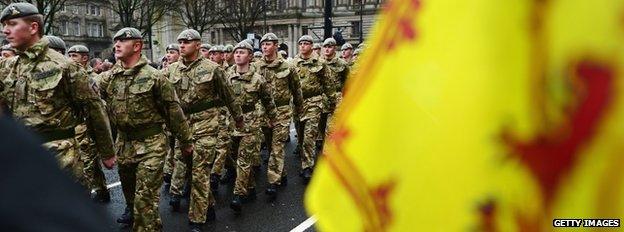Scotland's referendum: What are the issues around defence?
- Published
The issue of how Scotland might defend itself in the event of independence has been hotly debated.
The Scottish government say after a Yes vote it will get rid of nuclear deterrent Trident from Scottish waters and establish a 15,000-strong defence force. However, pro-Union supporters believe the UK's shared defence set-up provide benefits of scale.
Here, we bring together the main stories, explainers and official documents covering the issue.


What's the current set up?
There are about 101,00 British Army regulars who are based both in Britain and abroad. Its defence hardware includes nearly 300 jets and helicopters, four nuclear submarines and an array of seagoing vessels including 13 frigates. In November 2001, British Army personnel took part in the invasion of Afghanistan and two years later, they took part in the invasion of Iraq.

What could change post-Yes?
In its White Paper on independence, the Scottish government said the UK's Trident missile submarines, currently based on the Clyde, would have to go. The SNP says it will set up a 15,000-strong "defence force" that would aid overseas peacekeeping and disaster relief operations, but would not be sent into contentious conflicts like the Iraq War. After independence, Faslane Naval Base would become Scotland's naval HQ under a £2.5bn defence and security programme.

What do the pro-Union parties have to say?
UK Defence Secretary Philip Hammond says the Scottish government's defence plans under independence are not credible. The defence industry in Scotland employs about 12,600 people, generating sales in excess of £1.8bn a year and Mr Hammond believes a "separate Scotland could not hope to develop the same level of protection and resilience".

Who is saying what, including you?
Politicians, academics, industry experts and members of the public have had much to say about the current defence system and what might happen to it in the event of a "Yes" vote.
Dr Phillips O'Brien answers your questions on defence in an independent Scotland.
An animated recap of the arguments over defence in the Scottish independence referendum

Big reading - defence reports in full
... and for more reading on the referendum debate go to the BBC's Referendum library